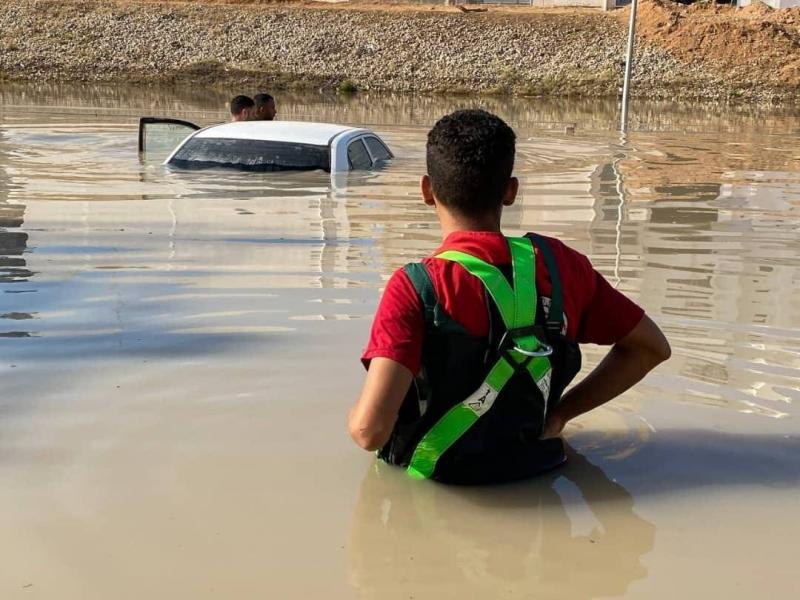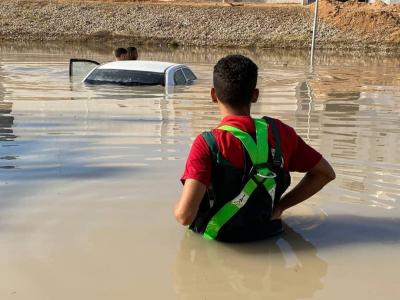Residents and rescue teams in the Libyan city of Derna are facing significant difficulties in dealing with thousands of bodies returned by the waves to the shore or decaying under the rubble after floods destroyed buildings and swept many people into the sea. The World Health Organization and other relief organizations have urged the Libyan authorities to stop burying flood victims in mass graves, stating that this could lead to long-term psychological issues for families or pose health risks if the bodies are buried near water sources. These appeals from relief agencies came after a United Nations report indicated that more than a thousand people have been buried this way since Libya was struck by the disaster caused by heavy rainfall on Sunday, due to a severe storm coming from the Mediterranean Sea. Thousands have died, and thousands more are still missing because of the disaster.
Bilal Sabluh, the director of forensic medicine for Africa at the International Committee of the Red Cross, stated at a press conference in Geneva, "Bodies are scattered in the streets, returning to the shore with the waves, or buried under collapsed buildings and debris. Within just two hours, one of my colleagues counted more than 200 bodies on the beach near Derna."
The Libyan Minister of Health, Ibrahim Al-Arabi, based in Tripoli, told Reuters that he is certain the groundwater has been contaminated by water mixed with human and animal corpses, garbage, and chemicals. He urged residents not to approach well water in Derna.
Mohammad Al-Qubaisi, the head of Al-Wahda Hospital in Derna, stated that there is a field hospital treating those suffering from chronic illnesses requiring regular care. He added there are concerns about the spread of waterborne diseases, but no cases of cholera have been reported so far.
The floods and torrents destroyed large areas of Derna in eastern Libya when they swept through a usually dry riverbed, leading to the collapse of two dams and the complete destruction of buildings while families slept. The International Organization for Migration in Libya reported today that more than five thousand are dead, with 3,922 confirmed deaths in hospitals, and more than 38,640 displaced in the northeastern region affected by the floods. Officials say the death toll could be much higher.
Nuri Muhammad, 60, standing in a bakery that is providing free bread to help the people of Derna, said, "We should be afraid of an epidemic... there are still bodies buried... and now the smell is starting to rise from the corpses."
The World Health Organization, jointly with the International Committee of the Red Cross and the International Federation of Red Cross and Red Crescent Societies, called for improved burial procedures.
Kazunobu Kojima, the medical official for biological safety and biological security in the WHO's emergency health program, stated in a joint statement, "We urge the authorities in the disaster-affected areas not to rush into mass burials or mass cremations." The statement called for the management of burial operations to improve, suggesting that they be done in individually designated and well-documented graves, stating that rushed burials can lead to long-term psychological problems for the victims' families, as well as social and legal issues.
Additionally, the statement noted that bodies of natural disaster victims do not pose "almost any" health threat, except when bodies are near fresh water sources due to the risk of contamination.
A doctor in Derna said this week that unidentified bodies have been photographed before burial based on the possibility that relatives might be able to recognize them later. A UN report from Thursday stated that more than a thousand bodies in Derna and over 100 bodies in the city of Al-Bayda, another coastal city affected by the floods, have been buried in mass graves.
The International Committee of the Red Cross sent a cargo plane to Benghazi, the largest city in eastern Libya, loaded with five thousand body bags. Additional assistance is coming from abroad.
The Norwegian Refugee Council, which has a team of 100 individuals in Libya, stated that dealing with the bodies is the most urgent concern. Ahmed Beirum from the Norwegian Refugee Council said, "I heard from my team that there are mass graves where rescuers say: 'Don't bring us food, don't bring us water, bring us body bags.'"
The Danish Refugee Council announced it will send a specialized demining team due to concerns that landmines may have shifted from their sites due to the floods.
Some residents expressed disappointment at the slow response of the divided authorities in the country to provide assistance. Saad Rajab Muhammad, 50, a security personnel living in Sousse, about 60 kilometers away and also affected by the floods, said, "The state is not helping us... and now I am on the street with my children and my wife."
Martin Griffiths, the UN Under-Secretary-General for Humanitarian Affairs and Emergency Relief Coordinator, stated at a press conference in Geneva that Libya needs equipment to find people trapped in the mud and damaged buildings after the floods and also requires primary healthcare to prevent cholera outbreaks among survivors.




